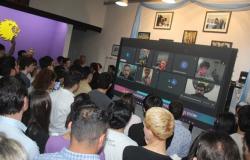Hear
With a positive trade balance for Argentina at US$646 million in 2023, The trade exchange with Switzerland was US$1,739 million that year.. Switzerland paid US$1,065 million for Argentine gold, and to a lesser extent also bought wine, meat and honey. Argentina, for its part, acquired immunological products and medicines, among others.
At the head of the Swiss Argentine Chamber of Commerce, Ernesto Kohen has a 40-year career in the world of fine watchmaking and has been the director of the Chronex Group since 1978. He knows in detail the particularities of trade and business between both countries. “No Swiss company left Argentina, even in the most difficult times”, he comments.
To reward good deeds in business, four years ago the Positive Actions Award from the Swiss Argentine Chamber of Commerce, whose registration and participation closes on May 31. “The award distinguishes actions that have achieved a positive effect in the community,” the regulations stipulate.
There are three themes in which you can participate: environmental and social sustainability; diversity, equity and inclusion and technology and innovation. The categories are large companies, SMEs and public organizations, universities and other large entities; Individuals can also be noted. There are cash prizes, the possibility of networking and also a trip to Switzerland for one person, presenting their work at the University of St. Gallen.
In the interview, where the major current issues are reviewed, Kohen makes a strong criticism of the tax on luxury goods or objects, within the category of internal taxes, which he defines as “regressive” and which is taxed at 25 Extra % to luxury items, adding a cost to the already onerous 21% VAT. “In Switzerland it is an industry that will export 30 billion Swiss francs in 2023,” he says. “It’s US$33 billion.” He adds that the tax slowed the growth of the sector in Argentina. He also referred to other complications such as the PAIS tax and withholdings on exports, and provided some definitions about the possible agreement between Mercosur and EFTA.
–How do you experience the geopolitical crisis, wars and conflicts from Switzerland?
–Actually Switzerland is a kind of island in Europe. The Constitution has the concept of neutrality. That means being quite far from war conflicts. Although this concept changed, it continues to be maintained very strictly in terms of non-involvement in any conflict that is not declared by the United Nations. It is a policy of consensus, peace and neutrality.
–What status is the possible agreement between EFTA and Mercosur?
–The EFTA is a free trade agreement between nations outside the European Union and is made up of Switzerland, Norway, Iceland and Liechtenstein. The free trade agreement between EFTA and Mercosur is being negotiated. There is a lot of interest. The technical part is very advanced. Two parliamentary delegations from EFTA have already come to speak with the Mercosur parliaments, because after the technical part is polished, this agreement has to be endorsed by the parliaments.
–Why is it not part of the European Union?
– It did not enter because of its democratic and federal system, which is an example. When parliament approves a law, they have time to, with 50,000 signatures, call a referendum. People participate. The referendum indicated that the country wants to remain neutral.
–Why is there interest in Argentina?
–We, from the Chamber, are agents of the official Swiss corporation dedicated to export promotion, which is called Swiss Global Entreprise (SGE). We receive requests for market reports from this organization. Lately these requests for reports have grown a lot, especially from companies that are focused on three areas: mining, transportation and agriculture. They are interested in investing above all in services. There are many Swiss companies that are already in the country. The ambassador, when announcing the positive actions award, highlighted that no Swiss company left Argentina even in the most difficult times. There are some that have been in Argentina for more than 100 years and have always adapted to different situations.
–How do you see Argentina?
–It is seen in the process of having a more open economy and greater dynamism of bilateral exchange. Swiss companies in Argentina are today, still, in the process of resolving all the financial engineering that requires the payment of liabilities that were pending with the great restrictions that previously existed for payments abroad. It is estimated that 50% of the debt has already been resolved via Boprear or counted with liquidation. Today they are also very busy negotiating with their parent companies, or with their foreign suppliers, how they resolve the reductions that each of these payment methods bring with them and the costs they have. But, it must be said that there is expectation because the announcements of a tax reform would release all this heavy burden that we have for both importers and exporters.
–What is the main concern today for Swiss companies?
– It is the PAIS tax that rose from 7 to 17.5%. This makes both exports and imports more expensive, because in reality it is not a tax on the product but on the currency. Afterwards, withholdings for exporters still exist. We have companies that export from Argentina and find themselves out of the market and we are waiting for it to be resolved. The expectation is in the tax reform and also in the labor reform.
–What is the trade balance between both countries?
–The trade balance with Switzerland is positive for Argentina mainly due to the purchase of raw gold by Switzerland. Then, it imports products made with gold (which comes from different countries around the world, not just Argentina). These imported products are taxed with a specific internal tax on luxury goods, which hinders the development of the fine watchmaking and jewelry market. As they are small transportable objects, they end up being purchased abroad. Argentina has a large market for this type of products due to a cultural issue. At the time, Buenos Aires was the beacon of fashion in Latin America. San Pablo was a consumer capital, but the launch of products in general, in the luxury market, was done in Buenos Aires. The Watch Show was held here, which has been held in Mexico for 10 years now. All this was lost, because this regressive tax, which distorts market prices, hinders the development of the sector. There was a golden era for the sector, which was when the tax was removed, during the time of Domingo Cavallo.
–Was there also an industry in jewelry and watches?
–At that time Argentina had an important jewelry industry. There were several very important factories that exported jewelry made in Argentina. But everything was lost with this tax. The market shrank and purchases abroad grew.
–How much is Switzerland exported in watches?
– Swiss exports, like the country’s economy, grew after the pandemic. Watches, in particular, fell in number of units, but grew in value. 70% of watch exports have values over US$10,000. Development is very important. There is the watch engineering career, for example.
–Could Argentina have its own industry?
– No, it is impossible to compete with Swiss know-how. That country considered working on the concept of innovation as a state policy many years ago. It has its own Silicon Valley, near Lausanne. That is why the watch industry incorporated a lot of robotics. But, for the haute horlogerie part, the human hand is essential.






